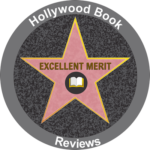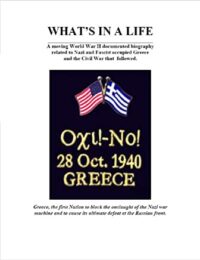Title: What’s in a Life
Author: Mark Athanasios C. Karras
Publisher: Karras
ISBN: 978-0981577258
Pages: 193
Genre: Memoir
Reviewed by: David Allen
Hollywood Book Reviews
 What’s in a Life is a heartfelt memoir, truly epic in scope. It not only captures the complex personal shadings of occupied wartime life, but makes intelligible the huge historic events of 1941-5 in Greece and beyond.
What’s in a Life is a heartfelt memoir, truly epic in scope. It not only captures the complex personal shadings of occupied wartime life, but makes intelligible the huge historic events of 1941-5 in Greece and beyond.
Greece, long the standard bearer for civilization, free thought, and democracy, suffered mightily but courageously, fighting off successive invasions by Mussolini’s Fascists, Hitler’s Wehrmacht, and by the subsequent incursions of Greek civil war between the Nationalists vs. Communists.
In each theater of war, the author, his family, his people, showed their true colors: blue and white, sure, but also brave, dignified, and free all over. In the telling, the anecdotes, foibles and fatuities of combatants and bystanders both are highlighted in bold – readers will feel as though they are in the hands of a master storyteller.
Making sense out of nonsense; out of the irrational, out of history — this is the task of the writer, the memoir-maker. The writer functions here as translator, deciphering the cold crude events of today that end up being fractals of so much which has come before. Author Mark Athanasios C. Karras, most reasonably, would have us learn the lessons of the past, lest we repeat them. His description of the German occupation of Athens is global, fitful, chilling: he describes how every sector of life, from breadmaking to couturier to finding shelter, is grievously impacted by the sullen impossible presence of the Hun. The narrative actually soars at times, putting one very much in mind of occupied Paris as described in Mark Helprin’s Paris in the Present Tense, and Ronald C. Rossbottom’s When Paris Went Dark. Each récit conveys the horror, intrusiveness and damnable is-ness of having an enemy in one’s backyard.
The Karras’ back story is of more than passing interest. Turns out that the family made it to the States but the paperwork was problematic and they had to return to Greece — at the worst of all possible times, smack dab in the middle of the Nazi invasion. Let there be no doubt: Karras’ father was a hero. Not only did he learn French, but he made a self-taught effort to translate Edgar Allen Poe into Greek. The other hero in the book is the author’s cool, wry sensibility, which he maintains throughout. He sums it up nicely, discussing how, in life, certain formulas always apply:
“[Be]…Idle and you will fail; rush and you will stumble; study and you will learn; try and you will gain; lie and you will rue; respect and you will be respected…When time is used with wisdom, the outcome is…good.”
This read about this man’s life in time is very, very good.

